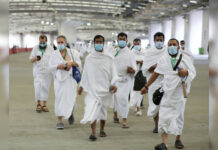[ad_1]
NEW DELHI: Nearly two-thirds of global drowning deaths occur in the Asia Pacific, said a World Health Organization (WHO) report.
WHO on Friday launched its first Regional Status Report on Drowning Prevention in the South-East Asia and Western Pacific regions.
During the launch of the report, Dr Poonam Khetrapal Singh, Regional Director, South-East Asia, WHO said, “Drowning is the third leading cause of unintentional injury death worldwide, accounting for 7 per cent of all injury-related deaths.”
Low and middle-income countries account for more than 90 per cent of unintentional drowning deaths, and over half of the world’s drownings occur in the South-East Asia and Western Pacific regions, according to WHO.
In 48 of the 85 countries with serviceable data on drowning, drowning is among the top five causes of death for children under the age of 15 years. Drowning accounts for 75 per cent of all deaths in flood disasters, which many countries in the South-East Asia and Western Pacific regions are particularly vulnerable to, the report says.
For the first time ever, these reports provide knowledge on the status of drowning prevention and water safety in each of the regions, giving a snapshot of the scale of the problem, efforts that are underway to take action, and opportunities to address what is an entirely preventable cause of mortality and morbidity.
“In both regions, communities and individuals interact with water on a daily basis: when swimming at beaches or in pools; when travelling long distances over water in boats; when using rivers and ponds for collecting water and sustaining livelihoods; and when facing exposure to floodwaters caused by seasonal weather events such as monsoons, or extreme weather events such as cyclones and typhoons,” the report specifies.
“To reduce the risk of each of these hazards and more, policymakers can leverage a range of evidence-based and low-cost interventions, which should be integrated into regional and national agendas, including on mitigating the health impacts of climate change,” said Dr Khetrapal.
Through multisectoral coordination, strong leadership, and ongoing planning, monitoring and evaluation, together we can reduce the burden of drowning in the South-East Asia and Western Pacific regions, for a safer, fairer and healthier future for all.
In 2019, over 1,44,000 people drowned in the Asia Pacific region, accounting for 61 per cent of global drowning deaths, according to the first World Health Organization (WHO) regional assessments on drowning prevention released on Friday ahead of World Drowning Prevention Day. Drowning claimed the lives of an estimated 70,000 and 74,000 people in the WHO South-East Asia and Western Pacific regions, respectively.
The two WHO reports, Regional Status Report on Drowning in the Western Pacific and Regional Status Report on Drowning in South-East Asia, also warn that climate change, to which the Asia Pacific region is particularly vulnerable, places already vulnerable communities and individuals at increased drowning risk.
More frequent and extreme weather events can lead to more regular and intense floods, increasing populations’ exposure to potentially hazardous interactions with water.
Of the 70,000 drowning deaths in the WHO South-East Asia Region in 2019, more than 33 per cent were among children aged under 15 years. On average, men were three to four times more likely to drown than women.
Twenty of the Region’s 37 countries and areas participated in the report, of which eight reported having either national or subnational strategies, policies or plans to reduce drowning. Additionally, 15 countries reported having systems in place to capture national data on drowning and implementing mass media campaigns on drowning prevention.
WHO on Friday launched its first Regional Status Report on Drowning Prevention in the South-East Asia and Western Pacific regions.
During the launch of the report, Dr Poonam Khetrapal Singh, Regional Director, South-East Asia, WHO said, “Drowning is the third leading cause of unintentional injury death worldwide, accounting for 7 per cent of all injury-related deaths.”
Low and middle-income countries account for more than 90 per cent of unintentional drowning deaths, and over half of the world’s drownings occur in the South-East Asia and Western Pacific regions, according to WHO.
In 48 of the 85 countries with serviceable data on drowning, drowning is among the top five causes of death for children under the age of 15 years. Drowning accounts for 75 per cent of all deaths in flood disasters, which many countries in the South-East Asia and Western Pacific regions are particularly vulnerable to, the report says.
For the first time ever, these reports provide knowledge on the status of drowning prevention and water safety in each of the regions, giving a snapshot of the scale of the problem, efforts that are underway to take action, and opportunities to address what is an entirely preventable cause of mortality and morbidity.
“In both regions, communities and individuals interact with water on a daily basis: when swimming at beaches or in pools; when travelling long distances over water in boats; when using rivers and ponds for collecting water and sustaining livelihoods; and when facing exposure to floodwaters caused by seasonal weather events such as monsoons, or extreme weather events such as cyclones and typhoons,” the report specifies.
“To reduce the risk of each of these hazards and more, policymakers can leverage a range of evidence-based and low-cost interventions, which should be integrated into regional and national agendas, including on mitigating the health impacts of climate change,” said Dr Khetrapal.
Through multisectoral coordination, strong leadership, and ongoing planning, monitoring and evaluation, together we can reduce the burden of drowning in the South-East Asia and Western Pacific regions, for a safer, fairer and healthier future for all.
In 2019, over 1,44,000 people drowned in the Asia Pacific region, accounting for 61 per cent of global drowning deaths, according to the first World Health Organization (WHO) regional assessments on drowning prevention released on Friday ahead of World Drowning Prevention Day. Drowning claimed the lives of an estimated 70,000 and 74,000 people in the WHO South-East Asia and Western Pacific regions, respectively.
The two WHO reports, Regional Status Report on Drowning in the Western Pacific and Regional Status Report on Drowning in South-East Asia, also warn that climate change, to which the Asia Pacific region is particularly vulnerable, places already vulnerable communities and individuals at increased drowning risk.
More frequent and extreme weather events can lead to more regular and intense floods, increasing populations’ exposure to potentially hazardous interactions with water.
Of the 70,000 drowning deaths in the WHO South-East Asia Region in 2019, more than 33 per cent were among children aged under 15 years. On average, men were three to four times more likely to drown than women.
Twenty of the Region’s 37 countries and areas participated in the report, of which eight reported having either national or subnational strategies, policies or plans to reduce drowning. Additionally, 15 countries reported having systems in place to capture national data on drowning and implementing mass media campaigns on drowning prevention.


















